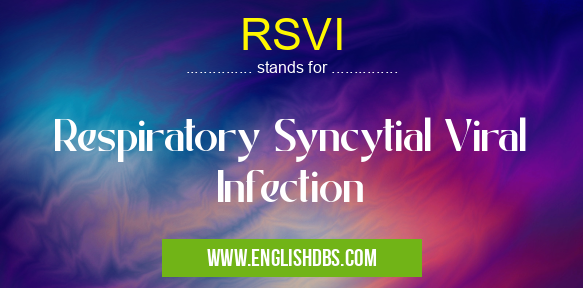What does RSVI mean in MEDICAL
Respiratory Syncytial Viral Infection (RSVI) is a common respiratory illness that affects people of all ages. It is caused by the respiratory syncytial virus (RSV), a virus that is spread through contact with infected respiratory droplets.

RSVI meaning in Medical in Medical
RSVI mostly used in an acronym Medical in Category Medical that means Respiratory Syncytial Viral Infection
Shorthand: RSVI,
Full Form: Respiratory Syncytial Viral Infection
For more information of "Respiratory Syncytial Viral Infection", see the section below.
Transmission
RSV is spread through contact with infected respiratory droplets. These droplets can be produced when an infected person coughs, sneezes, or talks. The virus can also be spread by touching objects or surfaces that have been contaminated with the virus, and then touching your face.
Symptoms
The symptoms of RSVI can vary from mild to severe. In infants and young children, the most common symptoms include:
- Fever
- Cough
- Runny nose
- Congestion
- Wheezing
- Difficulty breathing
In adults, the symptoms of RSVI are typically milder and may include:
- Cough
- Runny nose
- Congestion
- Sore throat
- Headache
Diagnosis
RSVI is diagnosed based on the patient's symptoms and a physical examination. In some cases, a laboratory test may be used to confirm the diagnosis.
Treatment
There is no specific treatment for RSVI. Treatment is supportive and aims to relieve symptoms and prevent complications. Treatment may include:
- Over-the-counter medications to relieve fever, cough, and congestion
- Inhalers to help open up the airways
- Antibiotics to treat secondary bacterial infections
- Hospitalization in severe cases
Prevention
There is no vaccine to prevent RSVI. However, there are a number of things you can do to reduce your risk of infection, including:
- Washing your hands frequently with soap and water
- Avoiding close contact with people who are sick
- Covering your mouth and nose when you cough or sneeze
- Staying home from work or school if you are sick
Essential Questions and Answers on Respiratory Syncytial Viral Infection in "MEDICAL»MEDICAL"
What is RSVI?
RSVI, also known as Respiratory Syncytial Viral Infection, is a common lower respiratory tract infection caused by the respiratory syncytial virus (RSV). It primarily affects infants and young children, causing symptoms such as fever, cough, runny nose, and difficulty breathing.
How is RSVI spread?
RSV is spread through contact with respiratory droplets from an infected person, either through coughing, sneezing, or close contact. It can also be transmitted by touching contaminated objects and then touching the eyes, nose, or mouth.
What are the symptoms of RSVI?
Symptoms of RSVI typically appear 2-8 days after exposure to the virus and can include:
- Fever
- Cough (initially dry, but may later become congested)
- Runny nose
- Wheezing
- Difficulty breathing
- Irritability
- Decreased appetite
How is RSVI diagnosed?
RSVI is usually diagnosed based on symptoms and a physical examination. A healthcare provider may also order a rapid antigen test or polymerase chain reaction (PCR) test to detect the RSV virus.
Is there a cure for RSVI?
No, there is no specific cure for RSVI. Treatment focuses on relieving symptoms and supporting the child's breathing.
How can I prevent my child from getting RSVI?
There is no vaccine available for RSVI, but preventive measures can help reduce the risk of infection:
- Frequent handwashing with soap and warm water
- Avoiding close contact with sick individuals
- Cleaning and disinfecting surfaces and toys
- Using a humidifier in the child's room
- Encouraging breastfeeding, as it provides antibodies that can protect against RSV
Final Words: RSVI is a common respiratory illness that can cause a variety of symptoms, from mild to severe. There is no specific treatment for RSVI, but treatment can help relieve symptoms and prevent complications. Prevention is key, and there are a number of things you can do to reduce your risk of infection.
